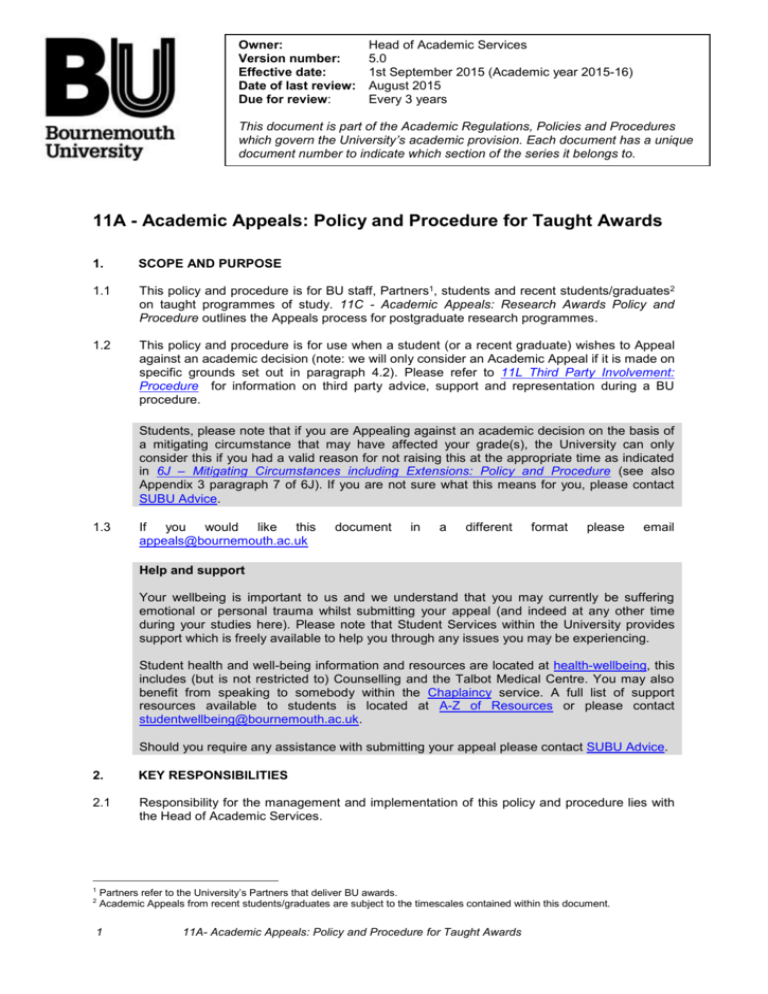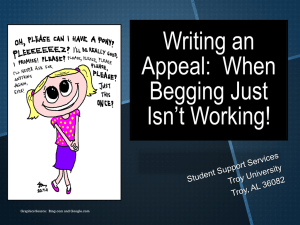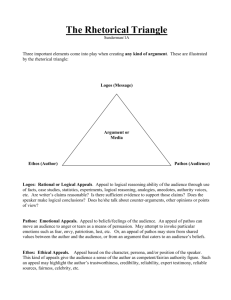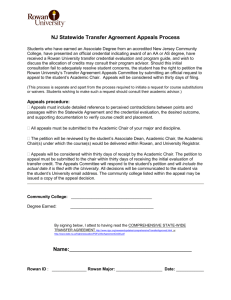11A Academic Appeals: Policy and Procedure for Taught Awards
advertisement

Owner: Version number: Effective date: Date of last review: Due for review: Head of Academic Services 5.0 1st September 2015 (Academic year 2015-16) August 2015 Every 3 years [Title] Policy This document is part of the Academic Regulations, Policies and Procedures which govern the University’s academic provision. Each document has a unique document number to indicate which section of the series it belongs to. 11A - Academic Appeals: Policy and Procedure for Taught Awards 1. SCOPE AND PURPOSE 1.1 This policy and procedure is for BU staff, Partners1, students and recent students/graduates2 on taught programmes of study. 11C - Academic Appeals: Research Awards Policy and Procedure outlines the Appeals process for postgraduate research programmes. 1.2 This policy and procedure is for use when a student (or a recent graduate) wishes to Appeal against an academic decision (note: we will only consider an Academic Appeal if it is made on specific grounds set out in paragraph 4.2). Please refer to 11L Third Party Involvement: Procedure for information on third party advice, support and representation during a BU procedure. Students, please note that if you are Appealing against an academic decision on the basis of a mitigating circumstance that may have affected your grade(s), the University can only consider this if you had a valid reason for not raising this at the appropriate time as indicated in 6J – Mitigating Circumstances including Extensions: Policy and Procedure (see also Appendix 3 paragraph 7 of 6J). If you are not sure what this means for you, please contact SUBU Advice. 1.3 If you would like this appeals@bournemouth.ac.uk document in a different format please email Help and support Your wellbeing is important to us and we understand that you may currently be suffering emotional or personal trauma whilst submitting your appeal (and indeed at any other time during your studies here). Please note that Student Services within the University provides support which is freely available to help you through any issues you may be experiencing. Student health and well-being information and resources are located at health-wellbeing, this includes (but is not restricted to) Counselling and the Talbot Medical Centre. You may also benefit from speaking to somebody within the Chaplaincy service. A full list of support resources available to students is located at A-Z of Resources or please contact studentwellbeing@bournemouth.ac.uk. Should you require any assistance with submitting your appeal please contact SUBU Advice. 2. KEY RESPONSIBILITIES 2.1 Responsibility for the management and implementation of this policy and procedure lies with the Head of Academic Services. 1 2 Partners refer to the University’s Partners that deliver BU awards. Academic Appeals from recent students/graduates are subject to the timescales contained within this document. 1 11A- Academic Appeals: Policy and Procedure for Taught Awards 2.2 The relevant Faculty Academic Administration Manager or Director of Operations coordinates the Local Stage of the procedure for Appeals from BU students and also for students on BU franchised / validated programmes at Partners (with the exception of AECC3). 2.3 The Quality and Enhancement Officer (Appeals & Academic Complaints) provides expert advice and co-ordinates the Central Review and Formal Hearing stages of this procedure. 2.4 The Appeals Board is chaired by a member of the University Leadership Team. 2.5 LINKS TO OTHER BU DOCUMENTS (all accessed via www.bournemouth.ac.uk/student/rules) 2.6 Other documents with direct relevance to this one are: University Student Rules 6A - Standard Assessment Regulations 6J – Mitigating Circumstances including Extensions: Policy and Procedure 11F - Student Complaints: Policy and Procedure 11L – Third Party Involvement: Procedure Student Examination Procedures Handbook Dignity and Respect (Harassment) Policy and Procedure Unacceptable Behaviour: Policy and Procedure4 Policy 3. INTRODUCTION AND CONTEXT 3.1 This policy and procedure relates to all forms of academic assessment for taught awards, whether by examination, written assignment, presentation or any other assessment method specified in the assessment guidelines. In certain cases the assessment may also refer to a period(s) of supervised work experience. 3.2 The Student Agreement and the policies and procedures described within outlines expectations and responsibilities for students and staff when dealing with students, and provide the framework for the student’s learning experience (www.bournemouth.ac.uk/thelegal-bit). 3.3 Guidelines about their responsibilities in relation to assessments are provided to all students in the Student Examinations Procedures Handbook updated annually. 3.4 The student must tell us about their mitigating factors under the relevant procedure before the Assessment Board meeting. If the student does not do this, they cannot Appeal based on these factors. For more information and copies of this procedure and the associated forms, see 6J - Mitigating Circumstances including Extensions: Policy and Procedure. 3.5 If the student wishes to make a Complaint at the same time as an Appeal, both will be dealt with concurrently. If this is not practicable, the Complaint will be dealt with under 11F Student Complaints: Policy and Procedures before the Appeal is considered. 3.6 Where a student is also subject to a University procedure (whilst pursuing an Academic Appeal) such as (but not limited to) Fitness to Practise/Study or a Disciplinary Procedure, the appropriate investigating officer will determine which Procedure takes precedence. The student will be kept informed at all stages. 3.7 The University takes all Appeals seriously and deals with them without recrimination. Where, however, an Appeal is believed to be frivolous, vexatious or motivated by malice, disciplinary action may be taken against the student under the relevant disciplinary policy. 3 Students studying on Master Chiropractic and BSc Human Sciences/MSc Chiropractic should refer to the AECC Academic Appeals Procedure. 4 In development. 2 11A- Academic Appeals: Policy and Procedure for Taught Awards 3.8 The University is committed to the fair and equal treatment of all individuals regardless of gender, age, disability, colour, race, ethnic or national origin, socio-economic group, sexual orientation, marital status, family responsibilities, religious or political beliefs. 3.9 The University is committed to ensuring that the Appeal is dealt with independently and without bias. The decision maker at each stage will be a different person, thus ensuring independence and the removal of the perception that any bias may have occurred. However, staff who have been involved at earlier stages may be required to provide evidence and information relating to the case. 3.10 The time limits set out in this policy and procedure will normally be followed. However, where for good reason, this is not possible the parties will be informed of the reasons for delay and kept informed of progress. 3.11 11A - Academic Appeals: Policy and Procedure for Taught Awards is an internal BU procedure and BU will not normally allow students to be represented by lawyers in hearings and Complaints. (See 11L Third Party Involvement: Procedure for more information about Third Party representation in Appeals.) Procedure 4. DEFINITIONS AND SCOPE OF THE PROCEDURE 4.1 The University defines an Academic Appeal as a request for a review of a decision of an academic body charged with making decisions on student progression, assessment and awards. 4.2 An Academic Appeal can only be considered on the following grounds: there has been a material irregularity or significant administrative error in the assessment process; the assessment was not conducted in accordance with the regulations for the programme; a student’s performance in assessment has been affected by illness or other factors which, for valid reason(s), s/he was unable to divulge before the meeting of the Assessment Board (see 6J – Mitigating Circumstances including Extensions: Policy and Procedure) (NB Any Appeal for mitigating circumstances to be considered should always be supported by appropriate formal evidence, e.g. GP letter); bias or the perception of bias in the assessment process / consideration of the Appeal (as per 3.9 above). NB Disagreement with the academic judgement of the examiners assessing the merits of an individual piece of work or in reaching any decision based on the marks, grades and other information relating to a candidates performance does not in itself constitute grounds for a request by a candidate for reconsideration. 4.3 A student may Appeal against a decision of an Assessment Board providing they can demonstrate that they have grounds as outlined in 4.2. Those involved in consideration of an Appeal at all stages will not attempt to re-examine the student, nor to appraise the professional judgement of the examiners, but to consider whether the decision of the Assessment Board was fair and whether all relevant factors were taken into account. 4.4 Students should be aware that even when an Appeal is successful, all students still need to complete and pass all elements of their work before progressing to the next stage of their programme. 4.5 Stages: The Academic Appeals for Taught Awards Procedure has three stages, a Local Stage, a Central Review Stage and a Formal Hearing Stage. Most Appeals can be resolved 3 11A- Academic Appeals: Policy and Procedure for Taught Awards by students pursuing matters directly with the staff concerned in their Faculty (this is the Local Stage). The student can only ask for a Central Review once they have completed the Local Stage. The Quality and Enhancement Officer (Appeals & Academic Complaints) will consider whether the Appeal is admissible on the grounds stated in paragraph 4.2 above and reserves the right to reject any Appeal that is not within the scope of this document. 4.6 Third party involvement in Academic Appeals: The student can be supported or represented by a third party (but not normally a legal advisor) at each stage. However, we will not investigate an Appeal made on the student’s behalf by a third party unless they have appointed the third party as their representative to manage the Appeal on their behalf. Please refer to 11L – Third Party Involvement: Procedure for further details. 4.7 Group Appeals: Where an Academic Appeal is brought by a group of students, normally one person should be prepared to identify her/himself as spokesperson and correspondent for the purposes of the Central Review and Formal Stage. All students must agree in writing to the spokesperson acting on her/his behalf. Each member of the group must be able to demonstrate that s/he has been personally affected by the matter that is the subject of the Appeal. 4.8 Nominees: Unless the context indicates otherwise, under this policy and procedure an Officer of the University, Chairman of the Assessment Board and a senior manager of the Students’ Union may act through his or her properly appointed nominee. 4.9 Access to Information: Students pursuing an Appeal through this policy and procedure will be entitled to apply for access to personal data in accordance with the policies and procedures of the University under the provisions of the Data Protection Act 1998 and other legislation. Applications should be made in writing to the appropriate Faculty Academic Administration Manager or to the Information Officer, Legal Services, Melbury House, 1-3 Oxford Road, Bournemouth, Dorset BH8 8ES. Further information about access to information can be found at Access to information. 5. INFORMATION FOR THE ASSESSMENT BOARD 5.1 Information before the Board meets: 5.1.1 If a student wishes the Assessment Board to take any relevant matters into account, for example personal matters such as illness or bereavement, s/he must inform the Chair of the Circumstance Board in writing which is held before the meeting of the Board at which the student’s examination performance is to be considered. Such information must be submitted with supporting evidence on the Mitigating Circumstances Form (available at 6J – Mitigating Circumstances including Extensions: Policy and Procedure) via the Programme Administrator up to 5 working days before the Circumstance Board meets. For students studying at Partners this information may be submitted via their Programme Leader or HE Administrator. Matters that could have been raised before the meeting of the Circumstance Board but, without valid reason, were not raised, will not be considered. 5.2 Illness 5.2.1 If the student claims to have been adversely affected by illness, he or she should submit supporting evidence from an appropriately qualified medical practitioner to the Chair of the Board, up to 5 working days before the meeting of the Board. Such information must be submitted with the relevant Mitigating Circumstances Form or via the Programme Administrator. For students studying at Partners this information should be submitted via the Partner’s HE Administrator. 5.2.2 See 6J – Mitigating Circumstances including Extensions: Policy and Procedure 4 11A- Academic Appeals: Policy and Procedure for Taught Awards 5.3 Confidentiality 5.3.1 All information received relating to personal matters will be treated in the strictest confidence and only disclosed to relevant members of the Board (normally the Chair, Programme/Framework Leader and Secretary) in order to allow a decision to be made in consideration of all the facts. 6. ACADEMIC APPEALS PROCEDURE: EARLY RESOLUTION AND LOCAL STAGE 6.1 Early Resolution 6.1.1 The University encourages the early resolution of any concerns that students may have. Students are therefore encouraged to discuss any concerns relating to their assessment outcomes (e.g. feedback/marks) during the year with an appropriate member of their course team in the first instance. If the student’s concern cannot be clarified by an informal discussion in this way, students have the opportunity to submit an Appeal in line with section 6.2 of this procedure. 6.2 Local Stage 6.2.1 Appeals should be addressed in the first instance within the Faculty. For students at AECC please refer to 2.2. 6.2.2 A student who wishes to Appeal must contact the Faculty Academic Administration Manager (or AECC equivalent) in writing within 10 working days of the publication of the results of the Assessment Board. Appeals received after this deadline will not normally be considered. Appellants should normally expect to receive a written response within 10 working days of receipt of their Appeal. This timescale may need to be extended during peak times. If the Appeal is upheld/partially upheld details of any change in the decision of the Assessment Board will be communicated to the student. The Faculty will tell the student about any delay and keep them informed of progress. 7 ACADEMIC APPEALS PROCEDURE: CENTRAL REVIEW STAGE 7.1 If the student is not satisfied with the outcome of the Local Stage, they may request a Central Review by completing the Academic Appeals Form (Appendix 2) and submitting it to the Quality and Enhancement Officer (Appeals & Academic Complaints) within 10 working days of the date of the Local Stage response. The form must clearly outline the reason for the Appeal and the conclusion that the student is seeking and include supporting evidence of the grounds for their Appeal. The student should also specify what action they have taken to date to attempt resolution and provide copies of all correspondence exchanged during the Local Stage. 7.2 Forms will normally be acknowledged within 5 working days of receipt. 7.3 The Quality and Enhancement Officer (Appeals & Academic Complaints) will consider whether the Appeal is within the grounds set out in paragraph 4.2 above and reserves the right to reject any Appeals that are not made on those grounds. If an Appeal is not within the scope of this document, the student will be informed in writing and given the reasons for this decision. 7.4 If the Appeal is within the scope of this document, the Quality and Enhancement Officer (Appeals & Academic Complaints) will write to, discuss with or meet the parties as appropriate and attempt to reach a satisfactory resolution of the matter raised. 7.5 The Central Review Stage will normally be completed with a response in writing within 20 working days of receiving the completed Academic Appeals Form and all accompanying information. This timescale may need to be extended during peak times. Where the 20 working days deadline cannot be met all parties will be informed of the reason for delay and kept informed of progress. 5 11A- Academic Appeals: Policy and Procedure for Taught Awards 8 ACADEMIC APPEALS PROCEDURE: FORMAL HEARING STAGE (APPEALS BOARD) 8.1 If the student is not satisfied with the outcome of the Central Review Stage s/he may request that his or her Appeal is considered by the Appeals Board 5. This request must be made in writing, within 10 working days of the date of the Central Review Stage response. The request should be addressed to the Quality and Enhancement Officer (Appeals & Academic Complaints) outlining why the outcome of the Central Review Stage is not satisfactory. 8.2 Once this information has been received, a senior member of Student Services and a senior manager of the Students’ Union together with the Quality and Enhancement Officer (Appeals & Academic Complaints) will consider whether the Appeal is admissible on the grounds set out in paragraph 4.2 above. If an Appeal is not within the scope of this document, the student will be informed in writing and given the reasons for this decision. 8.3 If the Appeal is felt to be admissible, an Appeals Board will be convened chaired by a member of the University Leadership Team and comprising one member of academic staff and a representative from the Students’ Union. All Appeals Board members shall be drawn from outside the Faculty to which the Appeal relates. The Quality and Enhancement Officer (Appeals & Academic Complaints) will provide procedural advice and secretarial support to the Appeals Board. The student may be accompanied by a friend or representative (not acting in a legal capacity) at this meeting and the Faculty/Partner may be represented by up to two members. Notes for Guidance on the conduct of an Appeals Board are attached as Appendix 3. 8.4 The Appeals Board will normally be convened within 20 working days of the student’s request and the student will be given 10 working days' notice of the date. 8.5 Accompaniment at an Appeal Hearing: The student, if s/he wishes, may be accompanied at an Appeal Hearing by a friend or representative (not acting in a legal capacity) for support or representation as appropriate. The friend or representative shall be permitted to put forward the student's case under the direction of the Chair of the Hearing, and shall be permitted to ask questions of the Faculty/Partner representatives. In the event that the student is unable to attend, the Hearing will normally be rescheduled. If every opportunity has been made to allow the student to attend the Hearing, the Hearing will either take place in the absence of the student or the University will reject the Appeal without further consideration. Please see 11L - Third Party Involvement: Procedure for more information. 8.6 Reimbursement of expenses: If an Appeal is upheld, the University will normally meet any reasonable 'out of pocket' expenses connected with the Appeals Board, on production of receipts; this may include UK travel and subsistence costs in connection with the student's attendance at the Appeals Board. 8.7 Powers of the Appeals Board: The Appeals Board has the power to annul a decision of the Assessment Board and to substitute it with a decision of its own (normally following advice from relevant examiners). 9 OUTCOME OF THE APPEALS BOARD 9.1 Normally the decision of the Appeals Board shall be communicated verbally to the student and the Faculty/Partner within one hour of adjourning to consider the evidence. If this is not practicable, all parties will be kept informed of progress and provided with reasons for the delay. The decision of the Appeals Board will be communicated in writing to all parties, normally within 5 working days. All verbal communications regarding the decision of the Research Awards Appeals Board shall be confirmed in writing, normally within 5 working days. 5 (Added October 2015 for clarity) Consideration by the Appeals Board can only be requested if the Appeal outcome is upheld or partially upheld. Where an Appeal is rejected and a Completion of Procedures Letter has been issued an Appeals Board hearing cannot be requested. 6 11A- Academic Appeals: Policy and Procedure for Taught Awards 9.2 If the Appeal is upheld, the Quality and Enhancement Officer (Appeals & Academic Complaints) or the Chair of the Appeals Board may make such instructions and/or recommendations as are deemed appropriate. 9.3 If an Appeal is not upheld, the student will be informed in writing with reasons for its rejection. 10 RIGHT TO HAVE AWARD CONFERRED 10.1 A student may not have a degree or other academic qualification conferred until all his or her outstanding examination or assessment Appeals have been resolved. 11 MONITORING, EVALUATION AND REVIEW 11.2 Faculties will wish to keep records of Appeals resolved during the Local Stage and may be asked to report on these from time to time. 11.3 The Quality and Enhancement Officer (Appeals & Academic Complaints) will oversee the tracking of Appeals progressed through the Central Review and Formal Hearing Stages and will ensure that records show the nature of the Appeal, how it was dealt with, the time taken for each part and the outcome. 11.3 The Appeals Board will report to the Academic Standards Committee setting out the grounds of the Appeal, the evidence received and the Board’s findings, including any accompanying instructions and/or recommendations. The purpose of this report is to ensure appropriate monitoring, evaluation and review of the Appeals process and the student’s confidentiality will be respected at all times. A copy of the report will also be sent to the student. General 12 REFERENCES AND FURTHER INFORMATION 12.1 If the student remains dissatisfied after exhausting Bournemouth University’s internal 11A Academic Appeals: Policy and Procedure for Taught Awards including the Appeals Board, s/he may request a review from the Office of the Independent Adjudicator for Higher Education. Contact details for the Independent Adjudicator are: Office of the Independent Adjudicator, Second Floor, Abbey Gate, 57-75 Kings Road, Reading, RG1 3AB. Tel: 0118 959 9813 Email: enquiries@oiahe.org.uk 12.2 This document has been mapped against the requirements outlined in Meeting the equality duty in policy and decision-making at Bournemouth University guidelines. 13 APPENDICES Appendix 1 - Flowchart Appendix 2 - Academic Appeals Form Appendix 3 - Appeals Board Guidance 7 11A- Academic Appeals: Policy and Procedure for Taught Awards






